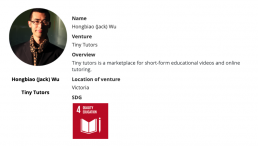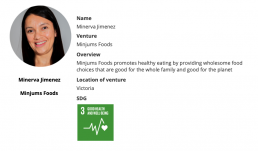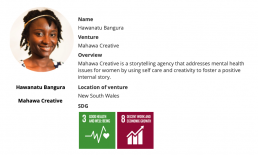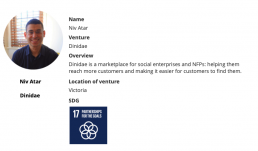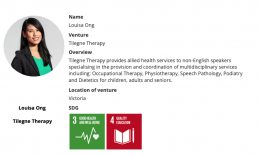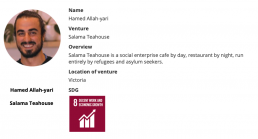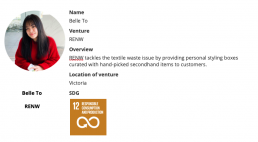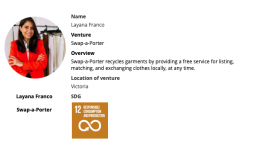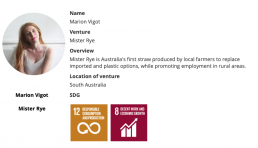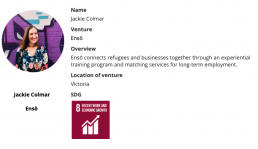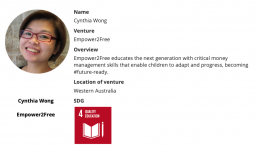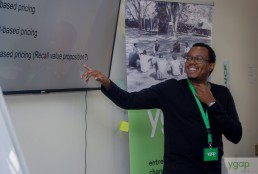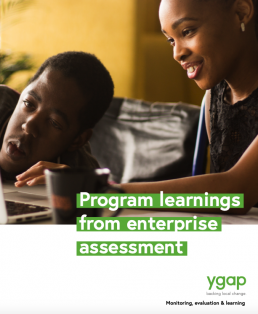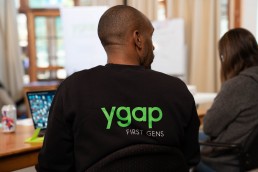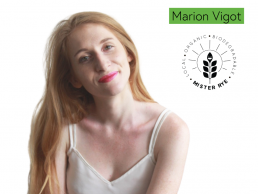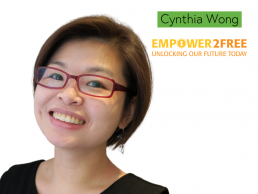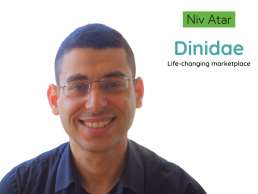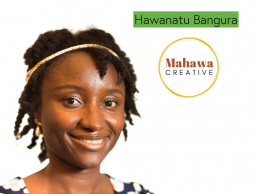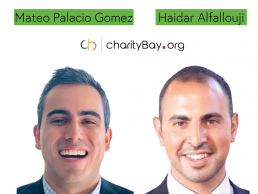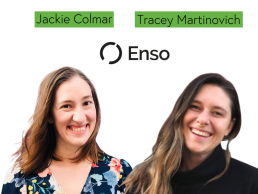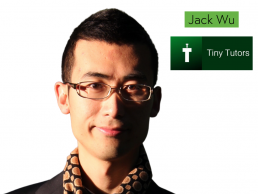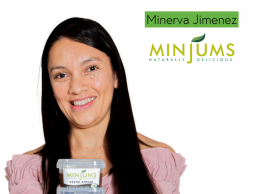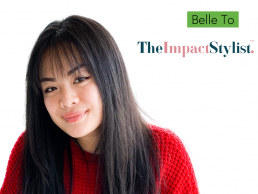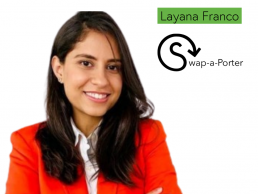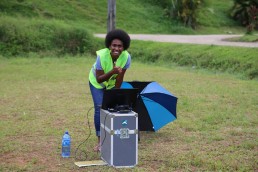Tracking Post-Program Progress
ygap Kenya Accelerator Program Site Visits
From ygap Kenya Impact Officer, Periz Odhiambo
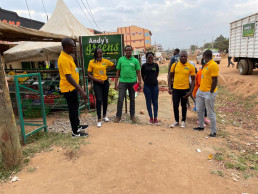
The ygap Kenya team with the team from 2021 cohort venture Andy’s Greens
The ygap Kenya June 2021 program site visits commenced on July 13th with the goal of visiting all the 22 participants in their various venture locations. For ygap Kenya, this marked the start of yet another phase of support through on site one on one strategy sessions to better understand their ventures’ operations and their individual experience after their participation in the bootcamp and to provide guidance and valuable insights on how to manage their sustainability plans, allowing for reflection on their ideas and intentions.
The key takeaway from the 2021 boot camp for a majority was to courageously step out of their comfort zones to explore the possibilities that would better define their venture’s visions and align their goals and activities toward business sustainability, defining their key customer segments, venture’s value propositions and benchmarking to effectively track target expectations with actionable results by comparing one’s own venture’s performance with an industry average, a leader within the industry, or a market segment.
It was notable that all the 22 entrepreneurs were keen to explore, learn and consider new ideas, refine their expectations and apply these experiences to achieve their ventures’ outcome. Despite the uniqueness of each individual founder and their sectors of operations, this exploration and discovery they were experiencing provided a way for the ygap program team jointly with the entrepreneur in session to map out their venture’s strategy to reach their goals.
Click the button below to meet the 2021 Accelerator Program Cohort and learn more about their ventures.
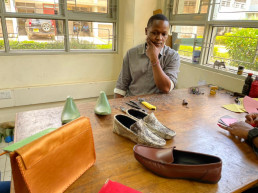
Site visit to Panther Leather in Kisumu
Stories of Inspiration: CommUnity Construction
Stories of Inspiration: CommUnity Construction
Every single entrepreneur selected to participate in a ygap program has an inspiring story to share. In this series, we’ll be hearing more from some of our program alumni about why they chose to start their business, some of the lessons they’re learned along the start-up journey, and how things have changed since being involved with ygap. This story is from the ygap First Gens program, supports migrants, refugees and diverse founders born overseas to thrive in the Australian business community. In this edition, we meet Hedayat Osyan, Founder of CommUnity Construction, which supports refugees in Australia to find sustainable and meaningful employment.
Refugees and asylum seekers face enormous challenges while starting their new lives in Australia. Additionally, refugees and asylum seekers are exploited at workplaces in Australia simply because they cannot speak English and lack strong support systems to help them either find a better job or campaign for better working conditions. In fact, 64% of refugees and asylum seekers remain unemployed in the first ten years of living in Australia. According to recent research, only 17% of 30,000 humanitarian refugees from Syria and Iraq who came in 2017/18 found employment in the first two years, despite having skills and qualifications.
CommUnity Construction was established in 2017 to provide education and employment pathways for refugees and asylum seekers in the Australia construction industry. The construction industry is ideal for those new to Australia, as it requires fewer qualifications and training is less time-consuming while still paying a livable wage. So far, CommUnity Construction has trained and employed many refugees and asylum seekers in Sydney. At CommUnity Construction, they believe that their business will be able to help thousands of refugees and asylum seekers find jobs and become independent in the coming years.
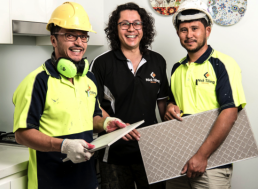
As an ex-refugee from Afghanistan, founder of CommUnity Construction, Hedayat Osyan, knows that it’s extremely difficult to find a job in Australia. While working in the construction industry, Hedayat learned first hand that refugees and asylum seekers are exploited every day through underpayment, pay withholding, threats, and working overtime without appropriate compensation.
Exploitation has a negative impact on lives, as refugees quickly become disappointed and hopeless when they experience exploitation in Australia. Most refugees don’t have a strong command of English and what social connections they have are forced to act as a safety net and support system. Through his interactions with other refugees and asylum seekers and his own lived experiences, he knew he wanted to help. Hedayat holds a Certificate IV in new small business from NSW TAFE, and has honed his business skills with his experience running CommUnity Construction (formerly “Nick Tiling Services”) since 2017.
Hedayat: ‘Refugees and asylum seekers face many challenges in Australia but the main challenge in my opinion, is unemployment. When I finished university and started working, I found that lots of refugees were unemployed and some of them, when they got a job, they were exploited at their workplace due to their lack of English/ skills/networks and support from the government. So they expressed to me personally that they were interested in working and contributing to society but they need a safe environment, a safe platform to contribute to society and to also support their family.
So that’s why I started up and established my construction company, formerly Nick Tiling Services to now “CommUnity Construction” where I help to train and upskill refugees and support them in finding jobs in the construction industry. So far in less than four years, we have employed over 70 refugees and asylum seekers and we can see the impact of having a stable job on their everyday lives.’
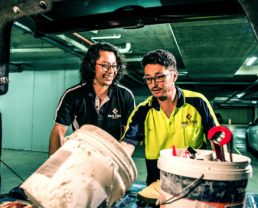
Employment is a vital pathway to achieving independence, but for our most vulnerable, barriers can get in the way. CommUnity Construction addresses these barriers by providing meaningful work experience, skills, confidence, and access to sustainable employment through a unique social enterprise approach. They identified that refugees and asylum seekers are some of the most vulnerable members of society and face enormous challenges when it comes to sustainable employment.
The Settlement Council of Australia reports that only 36 percent of humanitarian entrants find jobs in the first 10 years. This means that 64 percent of people seeking asylum and refugees remain unemployed for more than 15 years or permanently. As a former refugee, the founder, Hedayat Osyan, understands that without a sustainable job, it is impossible to establish a new life and a future for these families. CommUnity Construction provides a safe platform for refugees to find employment and become independent in order to contribute to society effectively.
Hedayat: When I was at the detention centre in Australia, I promised that I was going to work hard to contribute to Australian society. However, when I was released from the detention centre, I faced many challenges. I was exploited by my workplace because I couldn’t speak English at that time. Then when I finished my university, I landed a job. I consider myself lucky because I was under 18 years old and I had the opportunity to go to proper English classes and high school and then university.
However, there are many refugees and asylum seekers who don’t have this opportunity and have ended up unemployed for a long time in Australia and have become heavily dependent on social welfare. I thought I should change this stereotype and negative stigma about refugees where some people say ‘refugees are a burden to society, and they’re always heavily dependent on social welfare.’ I thought if we just work together, we can make a positive contribution to society. Therefore, I established this company, helping refugee and asylum seekers to become independent and contribute to society.
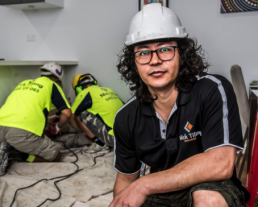
Hedayat was a participant in the November 2018 cohort of the ygap First Gens Program.
Utilising the $1,000 ygap small grant, CommUnity Construction printed t-shirts for its employees as a uniform and a way to build community and identity. A portion of the funds were also used to buy a new grinder, enabling the CommUnity Construction team to complete a technical project in Parramatta. CommUnity Construction used the funds based on their agreement with the ygap team.
At the conclusion of the First Gens Program, CommUnity Construction was selected as a Growth Entrepreneur and was awarded $12,500 in seed-funding. Using this grant, CommUnity Construction intends to purchase a van to transport employees and equipment from worksite to worksite. CommUnity Construction relies on hired transport to move tools from one site to another, which is costly and inefficient. Investing in a van will enormously reduce operating costs.
Hedayat: I studied politics and international relations in university so I had no idea and very minimal skills and no qualifications to run a social enterprise or a construction company. However, when I was accepted into the ygap program, ygap helped me from the beginning to the end, step-by-step. We had different training sessions and tailored support which is important to me. I’m very grateful for ygap where they helped me step-by-step to grow and become a very established company. For example, when I started my company and we had only operated for one year, I thought I’m probably going to just lead a very small company with five people a year. However, since I started working with ygap, they have helped my company to grow and connected me with different mentors, different professionals, such as accountants, lawyers, marketers, etc.
Also, when it came to the funding, it was huge for me. When I received the funding from ygap, this allowed me to purchase a van for my company. Before that, sometimes I travelled twice to take my employees from their homes to my workplace because I had only a small car. However, since I bought the van, it has been a great asset for my company.’
When asked about the value that participating in a ygap program had brought for Hedayat and his company, he had this to say:
Hedayat: I always thought that I knew the problem and the solution to address it. However, when I started with ygap, they tried to push me harder beyond my comfort zone to think about that problem deeply and then they helped me to develop the steps for devising a solution, in a different way from my original idea. It was a very interesting way to develop a solution that is more sustainable. Also in terms of the training, it was very helpful for someone like me, who has no knowledge to be able to run a social enterprise. It would have been impossible, without the support of ygap and their program.’
To learn more about CommUnity Construction, head to their website at https://communityconstruction.com.au/
ygap Kenya Accelerator Program 2021
ygap Kenya Accelerator Program 2021
In June of 2021, ygap Kenya began their inaugural Accelerator program with a residential bootcamp of 22 venture founders, selected from 84 applicants. The team had been intentionally targeting recruitment from rural areas and saw an incredible 90.9% of ventures apply from outside Nairobi.
Congratulations to the ygap Kenya team on running such a successful bootcamp, and at nearly double the participant numbers they usually take on in a cohort. Read on to find out more.
The yap Kenya June 2021 program commenced on June 13th with a 5 day intensive live-in accelerator at Lukenya Getaway in Athi River. For ygap Kenya, this marked the start of yet another partnership with The Argidius Foundation for the span of 2021-2023, strategically built around the common goal of helping entrepreneurs establish profitable businesses and contribute to the sustainable development of their communities.
In addition, this was ygap Kenya’s first accelerator run after the COVID 19 Pandemic hit the country in March, 2020. The restrictions imposed by COVID had the program team reschedule to dates (from 23rd May to June 13th) that worked well for the selected participants after the decline of infection rates and the lift of travel restrictions for the live-in accelerator .
The applications for the 2021 program were officially opened on 22nd February 2021 and ran for a period of 3 months. Ygap Kenya garnered a total of 84 applicants for the June 2021 Accelerator Program, majority of them (70%) being from male entrepreneurs. The Kenya program team focused on identifying and selecting the most promising early stage ventures with potential for growth to participate in the 2021 program.

A total of 22 founders (40.9 % female) from different regions were selected with a majority (90.9%) of the ventures based outside of Nairobi. Collectively the participating ventures aligned with various industry sectors- Agriculture (40.9%) Manufacturing/light (18%) and Education (9%) among other sectors. Their solutions proved to provide more holistic support for people in their communities through advocacy in job creation, education, healthy living and home safety.
The ventures also aligned with eight Sustainable Development Goals in total including: SDG 1 (zero poverty) , SDG 2 (zero hunger), SDG3 (Good Health and Wellbeing), SDG4 ( Quality Education), SDG 6 (Clean Water and Sanitation), SDG 7 (Affordable and Clean Energy), SDG8 (Decent Work and Economic Growth) and SDG12 (Responsible Consumption and Production). For over 7 years ygap Kenya has run a total of 13 accelerator programs, with the June 2021 cohort being the largest cohort yet.
For the ygap Kenya June 2021 program, the 5-day intensive workshop component of the program was facilitated by Carol Kimari and Albert Kimani- ygap Kenya’s Country Director and Programs Manager respectively. The accelerator week focused on refining the participating start-ups’ Business Models, building their Theories of Change, Financial Models, MEL Frameworks, Goal Setting, Pitch development, Mental Health & Wellbeing among others. The week concluded with two presentation events, peer review where all the 22 participants got to pitch their businesses to their peers and the demo day event where the top 11 ranked from the peer review got to pitch to judges who were experts in business advisory, recruited by ygap Kenya, to win their votes. The winner of both events was Getrude Kurgat of Gintex Limited.
Throughout the sessions, commitment and active participation were seen to be the key success drivers of the accelerator and this ultimately resulted in a 100% completion rate. Critically, the accelerator program was able to meet its objectives and received tremendous positive feedback from participating ventures with an NPS of 77.8% – highlighting the program’s value to the participants.
– Written by ygap Kenya Impact officer, Periz Odhiambo.
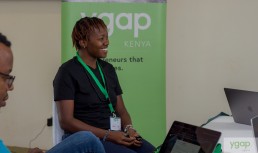
Program Learnings Report 2021
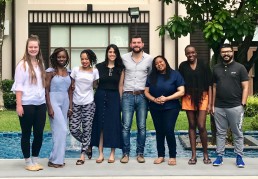
So we collected some data - now what?
Data collection is one of first steps in good impact measurement. But how can we learn from the data we collect?
If you’ve been keeping up with ygap for a while now, you would have heard us talk about our evolving impact measurement practices and learnt a bit about how we manage our impact and what data we collect to make our impact case. Now that we’re slowly building up a depository of data, what can we do with it?
During February this year, we ran our latest round of annual enterprise data collection. Enterprise data is what we collect from our ygap alumni up to two years after they complete their ygap program, and includes indicators such as whether their businesses are still operating, what their annual sales revenue are, how many employees they currently employ and how much funding or investments they have raised. The purpose of collecting this data is to construct a picture of the venture and the changes they’ve experienced since coming out of our program and to analyse how our program and support has played a role in those changes.
Across March and April, each in-country Impact team sat down with the MEL team to consider their data, and using annual sales revenue as a proxy for venture growth, in-country Impact teams reflected on the progress and outcomes that have occurred in the ventures we’ve supported, to evaluate the contribution of the ygap intervention, and determine the areas where we might have fallen short.
Some high-level findings of what we did well include:
- Developing a strong relationship with the venture and being seen by the ventures as being in the trenches with them
- Building confidence of participating entrepreneurs (particularly women and diverse founders) to own their entrepreneurial abilities, and to connect beyond their immediate community
- Brokering meaningful and useful connections for participants, creating linkages in order to address a pain point for the venture, for example, preventing the closure of one of the ventures when we facilitated a partnership with another party who was able to offer assistance with the venture’s cash-flow challenges through investment
- Leveraging the power of alumni and facilitating collaborations between current program participants and past program alumni
“We’re involved in one another’s business! Every step needs peer support, positivity and ability. I’ve found such value spending time with the other participants. [Other entrepreneur] and I would never have met – we were from different cohorts, working in different sectors. Now we can see synergy across our ventures and potential for collaboration” – Past Program Participant
Some areas where we fell short were:
- We didn’t clearly define what kind of entrepreneur and venture were the best fit for our program, and our due-diligence and pre-screening weren’t comprehensive enough
- Our program design and delivery didn’t adequately take into account ventures from regional areas or countries where we had no local contacts to support their development. Additionally, earlier programs that only consisted of the week-long residential component didn’t recognise the value in long-term relationship building of the support phase
- We didn’t manage our relationships with some of our ventures well enough, realising a lack of comprehensive alumni support, especially with ventures we had provided funding to or those with high growth potential.
Our next steps:
A number of recommendations were developed in light of our findings, some of which have already been implemented and others of which will continue to feed our future thinking and program development. To see these recommendations in detail and to read the full report, download here:

Program Learnings Report 2021
Please fill out the below:
Written by ygap’s Monitoring, Evaluation and Learning (MEL) Officer, Hedda Ngan. For more information about our MEL, contact hedda.ngan@ygap.org
Venture Recovery Stories: BridgeCap Insurance
Venture Recovery Stories: BridgeCap Insurance

60% of Kenyans don’t have access to essential healthcare services and only 40% can afford healthcare services. This is because the current existing healthcare insurance is too expensive. BridgeCap provides affordable and flexible healthcare insurance coverage for low income earners through an easy-to-use technological platform that is accessible both online and on every mobile phone.
How would you describe BidgeCap Insurance?
BridgeCap Insurance is a part of BCFS Group Limited, which also offers financing and advisory services. We are a wholesome financial hub. We provide affordable financial and insurance services to our clients. Bridgecap has three major products – SME loans/ financing, Financial Advisory services and Insurance Brokerage service.
How was the enterprise faring before the onset of the COVID-19 pandemic?
The year had started in a great way and the numbers were great. However, the COVID-19 pandemic entirely changed the shape of business. The financial advisory side of business slowed down, but the insurance side of it picked up. Currently, the insurance business is the one sustaining the enterprise.
What are some of the challenges you have faced during COVID-19, in general as an entrepreneur and as a business?
The COVID-19 pandemic has resulted in an overall reduction in the need for financial advisory services sparked off the loss of a couple of our key clients. The other clients redirected priorities to other business areas besides advisory support significantly affecting our revenues. Initially this was such a tumultuous time for our venture that every company in every industry in every corner of the country and every family was adjusting to loss of income and shifting their priorities to the basics.
How has your business changed or evolved due to COVID-19?
It is during this challenging period that we launched our flagship medical plan, Endelea Plan, which comes in three packages. Under these plans, we have Endelea Jamii to reach the people at the bottom of the pyramid; the uninsured. BridgeCap is working with them to give them financing to run businesses and in turn they can afford the small premium we charge for our cover. This is the social aspect of the business.
We have made health insurance accessible to those who cannot afford to pay in lump sum as we allow our clients to pay in installments enabling them to access world class treatment. We have also enhanced our digital platform capabilities offering our clients options to conveniently access our products and complete transactions through online portal, mobile app and USSD service.
In your own opinion, what is the most significant change that took place with your venture in the past 3 months?
New advisory client acquisition. We have been able to sign a new advisory agreement with the county government and also developed new partnership with a lead insurance company, Jubilee Insurance.
Why was this particular change the most significant to you?
These partnerships have increased our visibility and in turn we have been able to increase the venture’s impact to 350 individual clients with access to insurance cover and 30 enterprises having access to business financing.
What role has ygap played in those changes and / or what are some outcomes your venture has achieved as a result of being supported by ygap?
ygap has actively supported Bridgecap in Marketing Strategy development to increase the ventures visibility on social media. In addition, as a mentee, the external mentorship program offered by ygap has been valuable in terms of engaging mentors who are entrepreneurs as well making it easy for them to relate with some of the challenges a founder goes through and develop workable strategies surrounding these challenges.
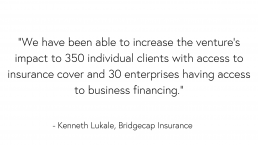
What does the future of your venture look like post COVID-19?
Surprisingly, our insurance has performed better than the previous years. So far, our services are available in over 100 medical facilities. We hope to keep this growth trajectory in the coming years by leveraging on technology. We are working tirelessly to ensure more people in low income areas are able to access good and quality health care by working with hospitals operating in those areas.
What are the key ingredients for successfully overcoming challenges?
A business owner must be “all in,” and willing to devote more than the typical 40 hours per week if they hope to succeed and be open to establishing business partnership. If sales and marketing are not your strong suit, reach out to someone who can advise you on the same.
How have you been able to pivot/adapt so fast in the face of a pandemic?
Throughout the crisis, the healthcare sector has been open and collaborative. The strongest leaders will continue to welcome support from partners and communities to deliver the best possible long-term care. We have been able to reach out to other regional hospitals to engage their patients in insurance conversations and adapt to taking up insurance covers. Bridgecap has also used the lessons learnt during the pandemic to meet future demand for Insurance and Advisory services
What is your advice to other entrepreneurs in regards to adapting/coping during a pandemic?
To always maintain good terms with everyone you work with and create a network in your field that can both help you transition to a new product and give you advice along the way.
I would also recommend an entrepreneur concentrating on the impact of a solution to one small problem and what revenue it will incur. Instead of going after the big problem right from the get-go, take incremental steps, innovating and modifying your prices along the way.
On a scale of 1-10 (1= unlikely and 10= very likely), how likely would you be to recommend other early-stage impact entrepreneurs to look to ygap for support to help grow their ventures? Also why?
I would give it a 9 because the strategy support they give ventures and the willingness to provide that link to experts to address specific venture challenges is valuable in developing future action plans.

Kenneth Lukale of BridgeCap Insurance
BridgeCap Insurance is a ygap Kenya 2020 Program alumni, and recently completed the ygap Re-Accelerator Program, designed to support ventures through the effects of COVID-19.
A new way to Demo Day
Pitches From The ygap First Gens 2020 Cohort
The First Gens program supports the most ambitious, game-changing impact ventures led by migrants and refugees that are improving the lives of people living in disadvantage in Australia.
Australia’s first compostable straw, a social enterprise cafe, a storytelling agency, an online marketplace for social enterprises were among the twelve ventures that were selected for the ygap First Gens 2020 cohort, in our first ever virtual accelerator program.
Instead of holding a face to face Demo Day to finish the program, we decided to change format, asking ventures to instead provide a pitch in video form; a resource they can continue to use into the future, and a more accessible way to culminate the program (Head here for more on why we’re rethinking Demo Days).
We’d like to congratulate these ventures for being resilient, brave and for staying the course during an especially challenging and uncertain year. Below are the video pitches from the 2020 cohort of First Gens so you can hear about the ventures and be inspired by the work they are doing, just like we have been.
You can also show your support by following them on their socials, telling others about their work, or connecting them to a potential customer, investor or supporter.
Watch the pitch videos below:
For more information on First Gens, please contact: Kim Nguyen (First Gens program coordinator) at kim.nguyen@ygap.org.
ygap and Program Led Fundraising
ygap and Program Led Fundraising

The evolution of ygap’s fundraising strategy
Fundraising is an ongoing challenge for most Not-For-Profit (NFP) organisations despite how long they’ve been in operation. Delivering on their mission, which is what they do best, traditionally does not raise revenue in itself (quite the opposite) and planned impact-driven interventions must be carefully balanced against the necessary resources required to deliver these effectively. Securing funding for an early-stage NFP at the beginning of its journey however, can be even tougher. As a NFP starts out, it lacks the credible reputation, historical data, proven methodology, established systems and proven track record as an organisation to present a case for partnership. At this stage of its development, it becomes imperative for an organisation to be able to sell a vision of the future, and what impact they hope to make, in order to acquire that initial funding.
Developing a solid and proven body of activity becomes even more challenging for a young NFP engaging in the complexities of international development, often having to carefully enter and understand new ecosystems, form new partnerships, test new methods, and navigate the multi-dimensions of local context. Equally as challenging is developing income streams that are sustainable, diverse enough to avoid the risk of focusing all fundraising attention in one place, and that align with the vision, mission and values of the organisation. More challenging still is doing both of these things well, and in synergy.
As a young organisation, ygap’s early funding was based on selling a vision, a story of how the world should be, and finding partners who shared this vision. This strategy was incredibly effective for the burgeoning non-profit, especially in the portion of ygap’s history where it was primarily a fundraising body rather than an implementation body. ygap was masterful at developing innovative fundraising campaigns like Polished Man and 5 Cent, and starting our own social enterprises whose profits would support the funding of programs through implementation partners.
The funding we were able to raise through these early initiatives is a testament to the tenacity, vision and passion of ygap’s founders and the partners who seed-funded our work. To paint a picture of a future vision that people are not only excited by, but prepared to back with their investment is no small task. It is also the reason that ygap was in a position to merge with Spark* in 2015, an organisation with a similar vision and a values-aligned model for international development, as an implementation partner, and bring program delivery in-house. When the merger happened, ygap’s focus and expertise was broadened significantly and the need emerged to move toward funding our work based upon a proven impact model, and further align our income streams to this model.
What do we mean by program-led fundraising?
Since ygap has shifted its focus to program design and delivery, alongside fundraising, we have developed greater breadth and depth in terms of our expertise around impact enterprise, locally led development, and contextualising our work based on location. Programs are co-created by our In-Country Program Teams based on the specific needs of the ventures in the ecosystems in which we work, detailed data collection from past programs, and insights gleaned from past iterations, which all contribute to the continuing evolution of our methodology and increasing effectiveness.
Implementing programs based on these core foundations ensures that we approach our work in the most effective way and is most likely to achieve the program’s intended outcomes. Clear objectives underpinned by clear inputs, activities, outputs and outcomes, that are validated by a dedicated Monitoring, Evaluation and Learning strategy, provides ygap the opportunity to engage with funders who have trust in ygap’s ability to deliver on these outcomes, and are willing to support the organisation to continue to do so.
Whilst having retained and still striving towards our vision of ‘a world without poverty’, this new direction is about focusing in on the results we have to show from the work that we’ve done, the tangible improvements in key metrics that emerge with every new data set we collect, and the continually developing expertise of the organisation as a whole.
Why is program-led fundraising important?
Practicing program-led fundraising forces us to be very clear with the value proposition of our programs, and allows us to engage with partners who are aligned with our vision, mission and objectives. It means that we stand out from the crowd to those who have a specific interest in the work we do, the challenges we face and how we’ve learnt from them which leads long term partnerships that are based on transparency, integrity and accountability. Being program driven with a strong value proposition means that we can continue supporting locally-led change.
It may take a little more work but we believe it’s worth it and is as beneficial to our partners as it is to us. Adopting a lens of program-led fundraising means the care we take to ensure what we do is driven by the people we serve gives partners an intimate understanding of our work, and confidence that their investment is truly making a difference.
Closing
Program-led fundraising introduces a subtle but important shift to the dynamic of ygap’s impact work and our partnerships. Deep engagement with the communities in which we work and implementing programs that are driven by the local context allows us to deliver our work in the most impactful and effective manner. Importantly, it means that we have to be very clear with what we do and what we hope to achieve, and commit to presenting data to prove our theory of change. We must keep funders informed of progress, successes reached and the lessons obtained from the inevitable challenges faced that we look forward to integrating into future programs.
This shift towards program-led fundraising means that we can continue to invest in diverse revenue streams, and pursue innovative income ideas, but with a foundation that is based on the strength of our work, continuing to develop that synergy between our impact and our fundraising as we go.
To find out more about partnering with ygap, contact our Partnerships Manager, Christie Raymond, at christie.raymond@ygap.org
Venture Recovery Stories: Kahuto Pacific
Venture Recovery Stories: Kahuto Pacific
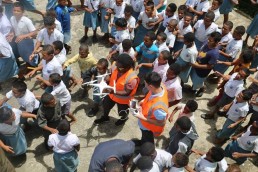
Kahuto Pacific are using drone technology to make a difference
Kahuto Pacific is an alumni venture of yher Pacific Islands. They exist to help companies, organisations, and government collect and transform data via GIS Mapping and drone technology to improve infrastructure, the environment, planning and much more. Through their technology they are able to survey in a couple hours what would take multiple survey crews a couple of weeks.
Kahuto Pacific is also helping to protect the Soga palm which is under threat of extinction in Fiji, using drones and GIS tools to help map this vital resource. The data captured will be used by Kahuto Pacific program partners to help implement more sustainable harvesting methods and empower farmers.
What are some of the challenges you have faced during COVID-19, in general as an entrepreneur and as a business?
Our operation was severely impacted with national lockdowns restricting movement around the country. In addition, our services were impeded by Fiji’s Civil Aviation Authority placing a halt on all flying not related to essential services. With our existing client base (loyal, returning Business to Business customers) also feeling the brunt of COVID-19, we experienced a stark decline in projects and cash flow. Amidst the uncertain landscape, it was challenging to maintain staff morale.
As an entrepreneur the biggest challenge was the uncertainty of everything around us, COVID19 – how long will it last? When will the borders open? How will the economy in Fiji be affected? What will the government do to assist Small and Medium Enterprises (SMEs)? So many questions, and not knowing the answers to all of them and trying to lead our company in this unique time was a huge challenge. We were constantly asking ourselves, should we close the business for the year 2020 to reduce our costs and spending and return next year? Therefore leading a team whilst trying to reassure yourself that everything will be okay is tricky and presents a challenge in itself. Also, since we’ve established our primary services after setting up the business COVID-19 made us think of how we would “pivot” or survive with our current services. The next challenge was then trying to decide what other services we could offer or how we could be supporting essential services.
How has your business changed or evolved due to COVID-19?
Thankfully Fiji has now entered a period of COVID-19 containment – restrictions have lifted considerably, allowing us to resume work.
COVID-19 initially seemed very gloomy and depressing for our business and I assume for many business owners. However, as we start to adjust to this “new normal” living with COVID-19, it has allowed our business to realign, reset and reboot ourselves through programs such as the ygap Re-Accelerator Program.
Our business now has a bit more clarity of what direction we wish to move forward in. We feel that COVID-19 has allowed us as business owners to evaluate our business, customers, and services and has made us better for it. Our business is evolving through a few of our services and has also evolved through getting re-started again after restrictions have eased.
In your own opinion, what is the most significant change that took place with your venture in the past 3 or 6 months?
As a business we’ve had to regroup and retarget our approach, particularly our marketing push – identifying new audiences and sectors, bolstering our brand, and amplifying our voice.
I definitely feel that the most significant change for our business is that we’ve had time (forced time during lockdown and the quiet period) to re-evaluate our business, identify areas that need the most attention and time. The Re-Accelerator Program has allowed us to focus on one of areas that we identified, especially online presence.
This process has allowed us as business owners to reset ourselves, and has given us more focus on the business than ever. So I think the change in mindset and being presented with the right tools, such as the program, has been the most significant change during the past 3 – 6 months.
Why was this particular change the most significant to you?
Given the uncertain times, it’s vital we diversify our customer base, secure alternative revenue streams and grow our reputation.
The change in mindset is allowing us to survive during this unique time and enabling us to discover news services and also focus on our areas of attention.
What role has ygap played in those changes and / or what are some outcomes your venture has achieved as a result of being supported by ygap and/or participating in the re-accelerator?
The Re-Accelerator Program is helping us enhance our brand and rejuvenate our online platform – a new website, improved content, a more holistic online marketing strategy and tactics.
This program has played a significant role in providing a platform not only to improve our online presence and branding but through the process of rejuvenating our online presence. It has reminded us of our ‘why’ and made our identity stronger and clearer.
The assistance provided through the program has been immensely helpful for us as business owners. It’s taken us back to the foundations of our businesses and has helped us make it a firmer foundation!
Since the program started we have been able to solidify our branding as a company, identify the best way to capture content for our website and explore many ways for improving our marketing.
I just want to emphasize that although the outcome of the program will be a new website and improving our online presence, the biggest outcome I will take from the program is it has allowed me to establish our why, and has made it clear for us on how to move forward.
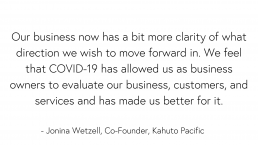
Is there anything you’re finding particularly enjoyable and/or valuable during the process?
The process has been simply amazing. It allowed us to identify our weaknesses and then it helped us strengthen a particular weakness. Being able to look at it from that point of view and then seeing the progress from the start has been great for myself. Talei has been absolutely outstanding and is so knowledgeable in this area, I feel very confident that we will achieve the outcome we want.
The 1 on 1 sessions are extremely beneficial as they allow us to share our thoughts and then worked with our scrambled thoughts and arranged it to make sense!
How do you see these outcomes improving your venture over the next 6-12 months?
Identity/Our Why
- Solidifying our identity through our branding and reminding us of our why will steer us in the right direction for our business. Having a clear vision of how we see ourselves as a company will then provide a clear path of where we want to go.
Online Presence/Branding/Website/Marketing
- The program has taught us so much and in particular of how we view our website and that it’s the hub of all our online presence. Knowing this will help us develop content and drive our online presence through our website. Our rejuvenated website will help us drive our quotes through the website and hopefully convert them to sales. That is the dream!
What does the future of your venture look like post COVID-19?
In terms of branding, we are much stronger now as who we are and how we present ourselves to our clients. Our future is still uncertain as we have no idea how long COVID-19 will last and when we move into “post COVID!” – but we feel somewhat confident that through focusing on our branding and making certain pivots, we will be able to survive!
Do you have any advice you’d like to offer other entrepreneurs in regards to adapting/coping during a pandemic?
It’s all in the mindset!
How likely would you be to recommend other early-stage impact entrepreneurs to look to programs like ygap for support to help grow their ventures? Also why?
100%
ygap focuses on the process and encourages you to think of your WHY? Knowing and identifying this brings clarity of how you will move forward as an entrepreneur.

Kahuto Pacific is a yher Pacific Islands alumni, and recently completed the ygap Re-Accelerator Program, designed to support ventures through the effects of COVID-19.
To learn more about Kahuto Pacific, head to https://www.kahutopacific.com/
Venture Recovery Stories: Sibocali
Venture Recovery Stories: Sibocali
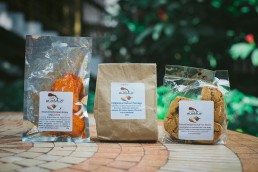
Some of the indigenous root vegetable products made by Sibocali
Sibocali is an agribusiness that manufactures a variety of edible products, such as crisps and porridge, that are made from indigienous South African root vegetables. The business works with rural women, where they teach them how to grow and harvest the vegetables that the venture uses in the production of its products.
Behind Sibocali is Sibongile Mtsabe, a local entrepreneur from a community in the KwaZulu Natal province of South Africa. Sibocali was selected for the 2020 ygap South Africa Re-Accelerator program.
What are some of the challenges you have faced during COVID-19, in general as an entrepreneur and as a business?
One of the first challenges was that our sales went down. Our usual processing facility was not available to us so we got a temporary one which was locked up later because those who we were sublet to were summoned to pay the rent balances for past months of lockdown, and they weren’t able to. We started looking for a space to install a container and looking for new clients as there were slow sales in retailers where we distribute. We didn’t have online platforms like Ecommerce or a website so we advertised on social media, but without a website people didn’t trust us hence there were barley sales.
We found a potential buyer, but they needed us to upgrade our space with industrial equipment so we could gain confidence with bigger retailers, like Amazon and Take a lot, which requires us to meet national standards in order to grow to international standards to gain a greater market share. We also experienced delays when applying for different types of support in different offices and the excuse was COVID-19.
How has your business changed or evolved due to COVID-19?
In the midst of sales slowing down, we got some clients that we did not expect, like the Pick n Pay Berea store. They gave us a chance to supply our crisps. We also got an assurance from our support at ygap to get a functional container that we will use as a mini factory.
We secured a space to set up our cargo container at KwaMashu Park and we are also getting more promises to get space which gives us an advantage. We have evolved; they say challenges help one to grow, and we have new products that we would have delayed producing if it was not for the COVID-19 challenges.
What has been the most significant change that has taken place over the past few months?
There are a couple of key changes; getting additional products in our range, support to sell online through ECommerce, getting a new working space, and linking with international potential buyers.
Another change was that the Kenyan Economic Development Department invited us to become suppliers. Fortunately, we had some of the products they needed and in short there is the potential of new markets opening for us. Despite the challenges, the business has grown all round.
Why were these particular changes the most significant to you?
It gave me joy to see the growth of the business, and though it has been challenging, this means more people will be impacted. Our economy will grow because we will soon need more suppliers and as a result there will be more job opportunities opening soon as we expand. Rural and township communities will soon be able to increase their income, especially through growing and supplying new produce to us.
What role has ygap played in helping your venture through those changes and what are some outcomes your venture has achieved as a result of participating in the ygap South Africa Re-Accelerator Program?
ygap played a great role in supporting us during trying times. We got a small grant that helped us to purchase the instant yam mash or instant stiff pap we needed for manufacturing, and we managed to get the place we temporarily worked in conducive to smooth processing. We will also get a container that will solve our pressing challenge of needing a working factory, and ygap will help us to link with people who will help us to recycle our waste for power generation and this will increase our profits. They are also assisting us to set up an ecommerce website. Sharing with other entrepreneurs through the ygap Re-Accelerator Program is helping us to think and revise the way we do business, and the ygap team is consistently checking up on us which keeps us motivated. ygap has helped us to stay afloat through the advice they shared.
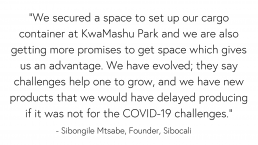
How do you see these outcomes improving your venture over the next 6-12 months?
The business has made links, meaning that new relationships have been ignited and we will maintain them and grow from them as we become better and bigger. We aim to build and grow a strong database of skilled farmers. As our standards have improved through the challenges of COVID-19, we hope to draw in new customers.
What does the future of your venture look like post COVID-19?
It looks bright and promising
What are the key ingredients for successfully overcoming challenges?
Never give up on your dreams, and when one thing is not working try something new using the same resources or additional resources to make things work. Pivot your business, there is always a way out.
What is your advice to other entrepreneurs in regards to adapting/coping during a pandemic?
Never give up in trying times, when things are getting tough it is a training for one to be innovative and think more on how to improve. Challenge your mind and your spirit to give better solutions. Focus on the prize and close the ears to noise called challenges. Remember that tough times don’t last but tough people do.
On a scale of 1-10, where 1 is unlikely and 10 is very likely, how likely would you be to recommend other early-stage impact entrepreneurs to look to ygap for support to help grow their ventures?
10 = very likely. I will recommend other entrepreneurs’ startups to ygap because they will learn how to find the roots of why they are doing their business. The discovery of why they do what they do will help them to derive a good strategy and move their business forward while impacting their communities.
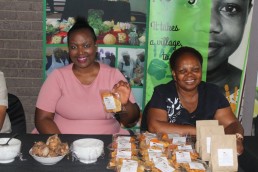
Sibocali is a ygap South Africa alumni, and recently completed the ygap Re-Accelerator Program, designed to support ventures through the effects of COVID-19.
Introducing the ygap First Gens 2020 Cohort
ygap First Gens welcomes a new cohort to its first virtual accelerator program
Australia’s first compostable straw, a social enterprise cafe, a storytelling agency, an online marketplace for social enterprises are among the twelve ventures that have been selected for the ygap First Gens 2020 program.
The First Gens program supports the most ambitious, game-changing impact ventures led by migrants and refugees that are improving the lives of people living in disadvantage in Australia.
The internationally acclaimed program comprises of a five-day intensive virtual program to fast track the ventures, access to mentorship and tailored support from ygap’s extensive network of technical and entrepreneurial mentors, access to pro-bono professional service providers including Hall & Wilcox and Pinnacle Health, small grants and up to $50,000 in funding for the most promising, viable ventures.
While our ventures face challenges that have been intensified as a result of the coronavirus pandemic, ygap First Gens will continue to back our ventures by providing a supportive community, sharing resources and opportunities so together, we can survive the challenges that lie ahead of us and work towards creating a better world for all.
“We are so excited to be welcoming a new cohort to the First Gens program. It’s such a privilege during these times to be able to fulfil our promise and commitment to continue supporting diverse founders across the Australian ecosystem. We are looking forward to working with these amazing founders to grow their businesses and maximise their social impact in the communities they serve.” – Adelide Mutinda, First Gens Program Manager
For more information, please contact: Kim Nguyen (First Gens program coordinator) at kim.nguyen@ygap.org.
Meet the new cohort:
